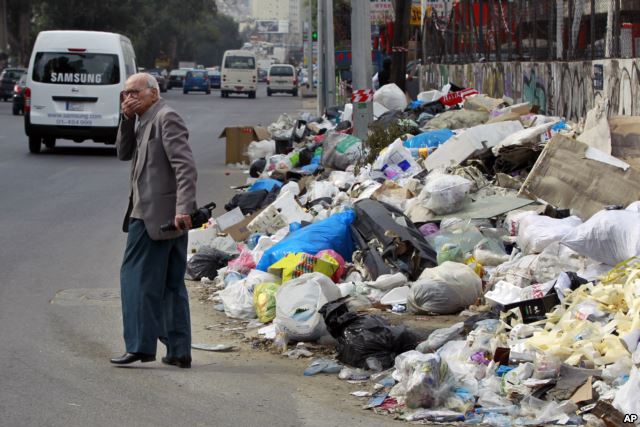
VOA – Reuters
February 02, 2016 3:52 PM
BEIRUT—
Beirut stinks. And now it’s getting dangerous.
Six months ago, Lebanon’s dysfunctional government shut the main landfill site for garbage from the capital, without providing an alternative.
Since then, rubbish collection has halted and festering trash has piled up in the city streets, causing what researchers and campaigners now say is a public health emergency.
Officials say they will resolve the crisis by paying a foreign company to ship rubbish abroad, although even the minister in charge calls the plan "crazy."
Activists say it is proof that a governing system, set up 25 years ago to share power among feuding sectarian groups and end a multisided civil war, has become so inefficient and corrupt that it is no longer capable of providing even basic services.
"We are not asking for an impossible thing," said Wadih al-Asmar, organizer of You Stink, a group formed last year to protest the rubbish crisis. "It’s obvious all countries should have a strategic plan on waste management."
Untreated, unmanaged rubbish threatens the water supply, academics say. Hills of waste rise from makeshift dumps across the city and surrounding areas, including the banks of Beirut River just meters from where it meets the Mediterranean.
Garbage has been burned, including in the normally lovely forests around Beirut, filling the air with foul smoke that contains dangerous levels of pollutants.
As waste burns, carcinogens in the air increase by at least 2,300 percent, and metals including lead and arsenic increase by as much as 1,448 percent, a study by the American University of Beirut and the Lebanese National Council for Scientific Research (CNRS) found.
"In an almost closed area like Beirut with increasingly tall buildings, this leads to a kind of suffocation," CNRS Secretary General Mouin Hamza told reporters. "Burning waste is suicidal."
‘Crazy people’
The Lebanese system of government stitched back together after the war carefully balances the interests of Sunni, Shi’ite, Christian and Druze groups. But the need for consensus in decision-making makes it easy for regional and community leaders to veto planning decisions.
The country’s infrastructure is under extra pressure from more than 1 million Syrian refugees who have joined the 4.5 million Lebanese.
As rubbish rotted in last year’s suffocating summer heat, protests broke out and anti-government movements such as You Stink and We Want Accountability crystallized. Protests were frequent but have now largely fizzled out after a security crackdown.
A woman named Lara, detained last year after a protest at the parliament, said: "The government should be responsible for collecting garbage. It is a basic right not to have garbage lying around everywhere in Beirut."
A long-term recycling and waste management plan proposed by a committee of experts late last year failed to make it off the ground because communities rejected proposed new landfill sites.
In Akkar, 120 kilometers (75 miles) north of Beirut, residents rejected plans to upgrade an existing rubbish dump into a managed landfill to take some of Beirut’s waste, despite being offered around $100 million in development grants, local campaigner Antoine Daher told Reuters.
Lebanese are used to finding other solutions when the state fails. The water and electricity systems have yet to be fully repaired since the civil war ended, but expensive private water suppliers and street-level power generators have stepped in.
Similarly, a local body, the Higher Chouf Municipalities Federation, has stepped in to deal with the garbage crisis in villages in the hills overlooking Beirut, pooling funds and donations to build a waste sorting and composting facility.
Sami Atallah, director of the Lebanese Center for Policy Studies, said structures exist for municipalities to manage rubbish systems. The American University waste task force has published a guide showing how municipalities can build facilities. But the government has shown little interest.
"Central government is still trying to monopolize the sector," Atallah said. "There is money to be made and they are trying to figure out how to split the pie."



